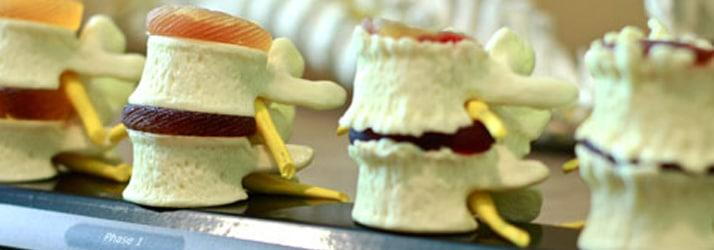
- posted: Jul. 02, 2018
If you have ever known someone who has experienced back pain, you may have heard them thrown around words or phrases like “I threw my back out”, “I slipped a disc”, or “my herniation is acting up”. Despite how different all these phrases may seem they all refer to disc problems. Herniated disc, slipped disc, collapsed disc, and ruptured disc are some of the most common names used by physicians for disc problems. What’s more confusing is that two different physicians may describe the same disc problem by a different name, leaving patients confused about their diagnosis and unsure how to proceed.
The good news is that most disc problems, regardless of their name, usually have similar underlying causes. This means that the same treatment options typically work for almost all types of disc problems. Most physicians will use naming conventions that were most common when they went to school, their mentors used, or sometimes what their professional societies dictate is the most accurate. Let’s try and clear the air between the two most common terms: a bulging disc and a disc herniation.
A vertebral disc is made up of two separate parts: and inner soft, jelly like center, and a tough and fibrous outer ring. In a disc herniation, a crack or tear forms in the tough outer ring allowing the soft inside to spill out and touch surrounding nerves. Herniated discs are often referred to as ruptured disc or slipped disc more commonly than its counterpart, the bulging disc. In comparison, in a bulging disc, the entire disc is stretching and protruding outward and may or may not apply pressure to surrounding nerves and cause pain. Bulging discs are much more common, with 1%-2% of the world population estimated to have them. Disc bulges often go unnoticed with little to no symptoms, whereas a herniation typically causes pain immediately.
Research has shown that chiropractic adjustments for bulging discs and herniated discs, including sciatic nerve pain, has helped adults experience less local pain and have fewer number of days in pain when compared to individuals who do not receive chiropractic care. Along with chiropractic adjustments lumbar decompression, specific muscle stretches and light exercise can all help after a disc injury occurs.
We hope this information helps you to make the best choice for your health. Our chiropractic team at Cape Coral Family Chiropractic is here to assist you in any way we can. Feel free to contact us today for more information!
Hours of Operation
8:00 AM - 12:00 PM
2:00 PM - 6:00 PM
By Appointment
8:00 AM - 12:00 PM
2:00 PM - 6:00 PM
By Appointment
8:00 AM - 12:00 PM
2:00 PM - 6:00 PM
8:00 AM - 12:00 PM
Closed


